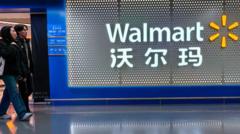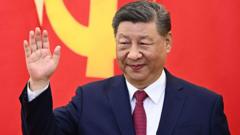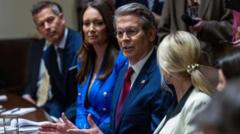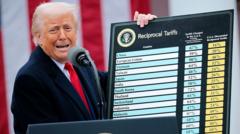As a trade conflict rages on between the world's two largest economies, China urges the US to eliminate all reciprocal tariffs, while the Trump administration offers minimal exemptions for certain technological products.
China Demands Total Tariff Cancellation from the US Amid Trade Tensions

China Demands Total Tariff Cancellation from the US Amid Trade Tensions
In the ongoing trade war between the US and China, Chinese officials call for the complete revocation of tariffs imposed by the US.
Chinese officials are intensifying their demands for US President Donald Trump to "completely cancel" the reciprocal tariffs that have exacerbated the current trade war between the United States and China. This escalation comes on the heels of Trump's recent announcement that he would implement a 90-day pause on a range of global tariffs, yet simultaneously increase tariffs on Chinese imports to a staggering 145%. "We urge the US to take significant action to rectify its mistakes and completely eliminate the erroneous practice of 'reciprocal tariffs,' returning to a path of mutual respect," stated a release from China's commerce ministry.
In a recent development, the Trump administration made a minor concession by exempting certain technological imports—mainly products manufactured in China—from the new tariffs. However, the Chinese commerce ministry labeled this move a "small step" and mentioned that they were currently assessing the implications of these exemptions. The exemptions, which include smartphones, computers, and semiconductors, provide reassurance to tech companies and consumers concerned about potential price surges for these products due to the tariffs.
Despite these minor concessions, a significant thaw in trade relations appears unlikely. US trade representative Jamieson Greer indicated on CBS's Face the Nation that there are no immediate plans for Trump to engage in dialogue with Chinese President Xi Jinping.
Since the onset of this tariff conflict in early April, the Trump administration has progressively increased tariffs on imported Chinese goods from an initial 54% to the current 145% rate. Conversely, China has retaliated by escalating its own tariffs on US products, starting at 34% and reaching as high as 125% as of this past Saturday. China's commerce ministry asserted that the country would "fight to the end" should the US continue its aggressive tariff strategy.
As President Trump travels to Miami, he has indicated that further details regarding the technology exemptions will be shared next week. The White House maintains that these tariffs are a bargaining tool intended to secure better trade agreements with other countries. Trump has touted this approach as a necessary effort to correct perceived inequities in global trade practices and to restore manufacturing jobs within the US. However, his policies have led to significant stock market volatility and raised widespread concerns about the potential negative impacts on global trade, job markets, and economic stability.





















